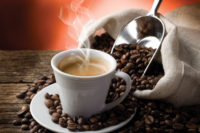Caffeine May Help Hangovers
January 21/The Philadelphia Inquirer -- Researchers at Thomas Jefferson University say they have identified a key agent in the brain chemistry responsible for hangover headaches and that a good remedy is one tried by every tormented soul who has ever groped for a morning-after cup of coffee: caffeine.
The stimulant has long been an ingredient in over-the-counter headache medications. However, the Jefferson study is the first to link caffeine's effectiveness to its ability to block the activity of a chemical called adenosine.
The researchers, who conducted their study on laboratory rats, also found they could relieve alcohol-induced headaches with an anti-inflammatory drug in the same family as ibuprofen.
While the research left some other scientists unconvinced, it represented a foray into an area of medicine that does not get much study. That may be because hangovers elicit little sympathy, said alcoholism researcher Robert Swift, a professor of psychiatry and human behavior at Brown University's Alpert Medical School.
"There are people who feel that one deserves to get a hangover, a negative consequence of drinking that might deter further drinking," he said.
Deserved or not, the affliction has stricken mankind at least since biblical times, as another researcher noted a few years ago in the Annals of Internal Medicine. See Isaiah 5:11, which says, "Woe unto them that rise up early in the morning, that they may follow strong drink."
The new study was overseen by Michael L. Oshinsky, director of preclinical research at the Jefferson Headache Center.
In the journal PLoS One, he and colleagues wrote that they began by giving an "inflammatory soup" to the rats -- administered through a small hole in the skull, multiple times over a three-week period, to make them more sensitive. Such rats have previously been shown to be extra-sensitive to some of the same chemicals that trigger migraines in humans.
The researchers then gave the animals the equivalent of one alcoholic drink, and they proceeded to block various steps in the pathway of metabolizing alcohol, so as to see which by-products led to headache-like symptoms.
They concluded that the problem starts with a chemical called acetate. Excess acetate leads in turn to the formation of adenosine, which accumulates in the brain and appears to be a chief culprit in headaches, the authors wrote.
The presence or absence of "headaches" in the animals was determined by prodding them with nylon filaments around the eye area, the same area that becomes tender in some human migraine suffers. A rat that responded by recoiling or stroking its face was deemed to have "hangover-like hypersensitivity." Rats that got caffeine or the anti-inflammatory drug, on the other hand, showed no such reaction.
In a search of the literature, Oshinsky found another intriguing clue. Dialysis clinics used to administer acetate to kidney patients, and 25% of them would report getting headaches.
"That was the real instant for me to say, 'Oh, it's the acetate,'" he said.
Swift, the Brown University professor, said the researchers' use of the rat model was "reasonable" and said the breakdown of acetate may indeed contribute to headaches. However, he cautioned that a hangover can include plenty of other symptoms, such as nausea, fatigue, and aversion to bright light.
"I don't think we have a definitive answer about what causes hangover," he said. "Nor do we have a definitive cure."
Another source of hangover malaise, Swift said, may be that alcohol causes the liver to release hormones called inflammatory cytokines -- the same chemicals that play a role in making a flu patient feel lousy.
From the February 7, 2011, Prepared Foods E-dition
Looking for a reprint of this article?
From high-res PDFs to custom plaques, order your copy today!



